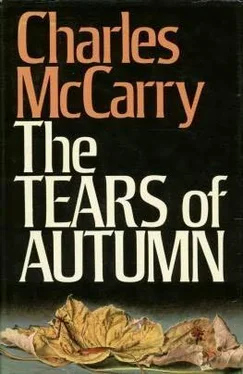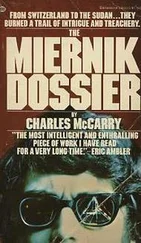“What are people saying about the Ngos since Diem and Nhu died?”
“That their luck ran out. In Vietnam, that’s always the explanation. We have no political analysts, only superstitions and fortune-tellers.”
“And killers.”
“Yes, we’ve always had a good cheap supply of those.”
“Do you think you have some sort of personal luck that keeps you alive, Luong?”
“Of course. Everyone believes that. Even some foreigners believe it, but not you yourself. I saw that in you from the first -you believe in nothing except the force of human intelligence. Isn’t that so?”
“I doubt even that.”
“I thought so. But there are other forces. One waits, and a force moves; it’s like water, soft and yielding, but also possessing great power.” Luong smiled.
“Lao-tzu,” Christopher said. “What’s your lucky number, Luong?”
Luong hesitated. “Eleven.”
“Has it come up lately?”
“Yes. Nhu wanted to kill me, you know. There were men waiting here for me while I was with you in Bangkok. But Diem and Nhu died while I was away, on November 1-the first day of the eleventh month, an eleven and a one, three elevens if you read from front and back.”
“What was Diem’s number?”
“That’s well known. Seven, double seven. He came to power on July 7, as you may know, too.”
“Does the number go on working after death?”
“I suppose so,” Luong said. “Any combination of sevens would be good for Diem’s spirit.”
“Would it make sense to honor his memory on a day seven days after his death, or fourteen days, or twenty-one?”
“Oh yes,” Luong said. “Triple seven, twenty-one, would be thought very auspicious… But you’re toying with our superstitions.”
“No, I try to understand these things. It isn’t necessary to believe in them to know they exist, even that they exert what you call force.”
“Well, perhaps one wouldn’t call such passive things a force.”
“What, then?”
Luong searched his mind for the French word. “An elegance,” he said.
No one in the tropics expects to see a white man at sunrise. Christopher did not live by the clock but by the rhythm of the place in which he found himself. In hot countries he moved on his targets in the cool of the morning. They were always surprised to see him. As he walked down Luong’s street under the stunted flowering trees, he received startled glances even from the children.
A few blocks away he found a taxi with its driver asleep in a patch of shade. He woke him and gave him the Truong toe’s address.
The Truong toe’s house was sealed. Shutters were fastened, doors locked. The house stood in a small park, and as Christopher walked among the flower beds and the palms it seemed to him that the noise of life parted at the gate and flowed around the walls of the garden. The babble of voices and the whine of scooter engines that filled the streets on all four sides of the narrow house were deadened. Christopher knew the noise was absorbed by the trees and the high wall cloaked with vines, but he thought, all the same, of the passive forces Luong had spoken about.
No one answered his knock. He stepped back and looked upward at the blank windows, then walked around the corner of the house to a terrace where bougainvillea grew over a trellis. Heavy iron lawn furniture, curlicued and painted white, was arranged in the shade; green mold crept up the legs of the chairs, designed to stand on a lawn beside the Loire. French doors opened on the terrace. Christopher saw someone in white robes move quickly across the room within. An entire wall was taken up by an ancestor’s shrine. Photographs of the dead and candle flames reflected in the panes of the terrace doors. The person inside was lighting a thicket of joss sticks on the shrine.
Christopher knocked again, and his fist rattled the glass. The white figure turned around; he saw it was a young woman who stood at the back of the room and stared at him. He knocked again, and drawing out his voice in the elongated tones of a Frenchman who has lived long in Asia, called, “Mademoiselle, s’il vous plaît!” The girl came to the glass door, held up both palms, and shook her head violently.
Christopher rattled the door handle and spoke in a loud voice: “A word with you, mademoiselle.”
She opened the door and, using the tu form, said, “Shut up. This house is closed.”
“I know, and I understand,” Christopher said. “But I’ve come all the way from Paris to see the Truong toe.”
“He’s not receiving visitors.”
“I have an important message for him. It concerns his family.”
The girl let breath burst from her nostrils. “This family?” she asked incredulously, looking at the color of Christopher’s skin.
“Yes-truly it’s very important to the Truong toe.”
“Who are you? Have you a card?”
“No-no card. But give him this.”
Christopher wrote on a page of his notebook, tore it out, and handed it to the girl. She folded the note without reading it, dropped her eyes, and closed the door again, turning the key in the lock. She pointed a finger toward the front of the house, and he went around to the main door. Fifteen minutes passed before it opened. The girl, striding in her ao dai like a Frenchwoman, led him through odors of fish sauce, furniture polish, candle smoke down a narrow hall to a room filled with books. She adjusted the blinds so that strips of light ran across the polished tile floor, and left him alone.
The Truong toe let Christopher wait for a long time. When he came in, he wore Vietnamese dress, white to signify his mourning. Without shaking hands, he sat down, holding the page from Christopher’s notebook between his thumb and forefinger. “Why do you bring me this message?” he asked.
“I wished to meet you. I thought you would want to have this information.”
“Well, then?”
“Your nephew, Ngo Tan Khoi, was garrotted after he entered his car in the parking lot of the casino at Divonne-les-Bains, on March 8,1958,” Christopher said. “He was buried that same night in the bottom of an open grave in the town of Gex, eight kilometers away. A woman named Marie-Thérèse Hec-quet, for whom the grave had been prepared, was buried in it on March 9.”
“By whom was he killed?”
“Not by your enemies. He was mistaken for a heroin dealer named Hoang Tan Khoi by the people who killed him. Your relative and the heroin dealer had the same given names and they were both Vietnamese.”
“Who were these people?”
Christopher gave him the names of the French gangsters. “Machelon is dead,” he said. “Gaboni is still in business; if one wishes to hire him, one leaves one half of a thousand-franc note in an envelope with the doorman of the Russian restaurant in the rue de Passy, in Paris. Gaboni will appear on the following Monday, at ten o’clock, in the public toilet on the Champs-Elysées, near the place Clemenceau.”
“How do you have this information?”
“I had it from Machelon.”
“Of what interest is it to me?”
“You now have it, in any case. I thank you for seeing me. Good-bye.”
Christopher uncrossed his legs and gripped the arms of his chair, as if to rise.
The Truong toe handed Christopher the notebook page. It was a gesture to establish trust; he was returning the evidence. “And you are what-a policeman? You speak like a Frenchman, but you don’t have the manners of the French.”
“I’m not a policeman. This is a personal matter-I greatly admired the late Ngo Dinh Diem. I knew him slightly. When he was murdered, I wished to express my sympathies.”
“You choose a bizarre method.”
Читать дальше












